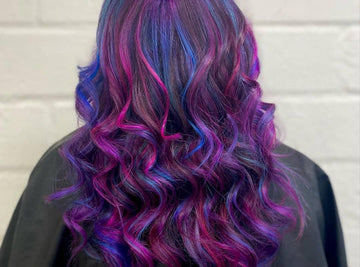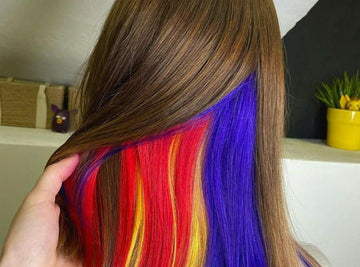I have had very black hair ever since I was a kid, and over the years I really wanted to try having blonde and even pastel colored hair! I tried starting out with brown tones (without bleaching) but it never worked! So, in order to get that blonde hair, I tried bleaching my hair. And voila! My black hair turned blonde!
It just gave me one main concern, my scalp was so itchy after bleaching! So, I tried everything that I could do to soothe my irritated scalp, and I will be helping you too in case you’re having the same problem as me.
One thing is for sure – you have to save this article if you’re planning to get your hair bleached and colored out. I also included a lot of things to take note of and some precaution if you’re about to get your hair bleached. Let’s get the list going and soothe that very itchy scalp!
What is bleaching?
Many people use bleaching to quickly lighten their hair, and thousands of them do it each week. Bleach can be used on the hair to achieve the recognizable platinum blonde appearance as well as to lighten the foundation color on which brighter, more vivid colors can be applied.
Therefore, using bleach to lift and eliminate the natural color of your hair is the only option if you want your hair to be a lighter shade. Before applying bleach on your hair, you have to know that sometimes it can be harmful when not done properly and may lead to a bleach burn.
You’re probably scared and worried about what a bleach burn is, but don’t worry! We’ll help you prevent this from happening. So, make sure to take all important notes on the topics below.
What is a bleach burn?

Bleach burn is actually considered as a first degree chemical burn on the scalp, so it really does hurt! If you’re not taking the right precautions, a common hair coloring session might lead to bleach burns especially if you’re not a professional in hair bleaching.
Bleach burn might look like how a usual burn looks like. You’ll notice some redness, stinging feeling, swelling, appearance of blisters, and pain on your scalp.
Don’t be too worried especially if this is your first time having a bleaching session because scalps react differently to bleach. You may or may not have a reaction to bleach, so a patch test is very important before proceeding to bleaching your hair.
Why does my scalp itch after bleaching?
If your scalp turns itchy right after bleaching, that doesn’t mean that you’ve already burned your scalp. the most common reason why scalps itch after bleaching is because of all the chemicals contained in bleaching products.
Chlorine, one of the main ingredients of bleach, usually causes the itch. Chlorine is an irritant that may cause your scalp to be very sensitive when it is applied. Plus, it also causes dryness on the scalp which makes it very itchy afterwards.
Related: What Causes Dry Scalp and Dandruff
How can I soothe my itchy scalp after bleaching my hair?
Now, let’s get to the most important part of bleaching – treating an itchy scalp! There are a lot of techniques to help soothe an itchy scalp right after you bleach and dye your hair so read to know what you have to do for your scalp problem.

Patch test always comes first!
You might have probably heard of the term patch test for skin and hair products, which is always recommended by professionals. And yes, this is always the first thing to do before bleaching your hair (especially if it’s your first time!).
During your very first bleaching session, you might not know if a certain bleaching product may or may not give you an allergic reaction. So, that’s when a patch test comes in very handy.
The majority of hair dye sold in all over the market share almost the same ingredients and components that may induce an allergic response to your scalp.
Both semi-permanent and permanent hair dyes contain para-phenylenediamine (PPD), which can result in dermatitis on the scalp. When lightening roots, dryness on the scalp from bleaching is also typical.
Always carry out a patch test a day or two before coloring your hair to ensure that you are not sensitive to it. Before applying the dye to your entire scalp, this will give you enough time to observe how your skin will respond to the dye.
Be gentle with your scalp

Ensure that you wash your hair and scalp gently but completely if you do get itchy skin after coloring your hair. Your scalp irritation may be brought on by dye residue that wasn’t completely washed away even after rinsing.
While your scalp is recovering from all of the chemicals from the bleaching products, you should also stay away from any harsh products, such as hair sprays and dry shampoos. This is crucial to do because using these products might irritate your scalp and cause buildup, which will exacerbate the problem and lead to more itching!
Skip the heat
Do you love drying your hair and styling it with heating tools? You might want to skip that out just right after you have bleached your hair. Direct heat can irritate your itchy scalp more, so it’s definitely a no no!
Now that winter is almost here, it can be difficult to leave with a wet head when the weather outside is freezing. When your hair is 80 percent dry, rough blow-dry your roots whenever possible.
A large color change should be followed by avoiding or using less heat on your hair to assist prevent further hair damage.
Moisturize and hydrate
We have mentioned that the chlorine component of bleaching products can cause your scalp to dry out. To remove the itchiness from the chlorine, you should always hydrate your hair with a good conditioner right after you apply your shampoo.
You might also want to stock up with your water intake to fuel your body and scalp with hydration from the inside!
Let your scalp rest
After dying your hair, your scalp may need a few days to recuperate and heal. Just like wounds, let your scalp rest after a harsh bleaching and coloring session.
After five to seven days, if you are still significantly irritated, then it’s time to see your doctor. You can have dermatitis on your scalp or you might have had your scalp burned.
Quick Home Remedies for Itchy Scalp

Right after you go to the salon and you notice that your scalp is becoming very itchy, then you might probably look for items at home that can ease the itchiness and irritation. Good news! There are actually effective home remedies that you can easily find in any household.
Ice Pack or Frozen Goods
Do you still have some frozen peas inside your freezer? They are actually a great remedy for your irritated or itchy scalp. You can also use other frozen goods, just make sure to put them inside a clean ziploc bag, then place it on your scalp.
You can also use an ice pack or cold water to cool your scalp. By doing so, you can prevent blisters from coming out and you can stop the burning sensation too. Also, you can keep the home temperature low too because a hot environment can cause the irritation to progress.
Aloe Vera Gel

Aloe vera is a great product to heal almost anything, even irritated scalps! If you don’t have aloe vera gel at home, you can also use other forms like lotions or creams. But personally, the gel type gives the most soothing effect on the scalp.
If you have burns on any part of your body, aloe vera is a go-to remedy because of its naturally calming and cooling characteristics. It is well recognized to lessen inflammation, eliminate bacteria, and hasten the healing process in addition to promoting the growth of healthy tissue and new skin cells.
Coconut Oil

Coconut oil works wonders in alternative healing regimens too, just like aloe vera. It works effectively on an itchy scalp because of all the nutrients and soothing properties. All you need to do is to take a few tablespoons of coconut oil and apply some heat to it until it turns liquid.
Once cooled, you can directly apply it on your itchy scalp and leave it on for at least 10 minutes. You would immediately notice a very fast relieving effect once you apply the oil on your scalp.
Key Takeaways
While getting your dream hair color can be quite damaging to your scalp, we hope that this article has helped you with all the remedies that you can use after bleaching.
Just a friendly reminder, if you notice that your scalp is getting worse even after you have tried all the remedies that we mentioned, please see your doctor asap!
Read More:





